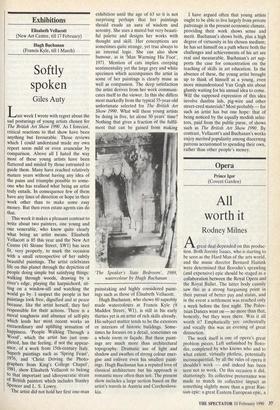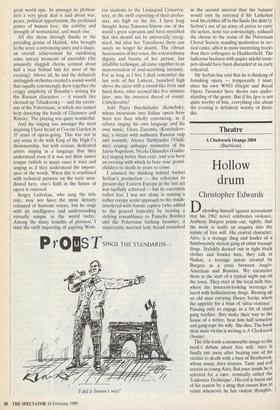Opera
Prince Igor (Covent Garden)
All worth it
Rodney Milnes
Agreat deal depended on this produc- tion. Both Jeremy Isaacs, who is starting to be seen as the Hard Man of the arts world, and the music director Bernard Haitink were determined that Borodin's sprawling (and expensive) epic should be staged as a collaboration between the Royal Opera and the Royal Ballet. The latter body cannily saw this as a strong bargaining point in their pursuit of better pay and status, and in the event a settlement was reached only a week before the first night. The Polov- tsian Dances went on — no more than that, honestly, but they were there. Was it all worth it? Emphatically yes: orchestrally and vocally this was an evening of great distinction.
The work itself is one of opera's great problem pieces. Left unfinished by Boro- din, completed by who knows who and to what extent, virtually plotless, potentially inconsequential, by all the rules of opera it shouldn't work — and indeed has been seen not to work. On this occasion it did, shatteringly. Its collective provenance was made to match its collective impact as something slightly more than a great Rus- sian epic: a great Eastern European epic, a great world epic. In amongst its plotless- ness a very great deal is said about war, peace, political opportunism, the profound power of human love, the nobility and strength of womankind, and much else.
All this shone through thanks to the presiding genius of Haitink, who brought to the score a convincing unity and a shape, an overall achievement far outshining some uneasy moments of ensemble (the unusually sluggish chorus seemed about half a beat behind him for most of the evening). Above all, he and the definitely unsluggish orchestra created a sound-world that equally convincingly drew together the craggy simplicity of Borodin's writing for the Russian characters — it sounds like cleaned-up Tchaikovsky — and the exotic- ism of the Polovtsians, in which one cannot help detecting the hands of Glazunov and Rimsky. The playing was quite wonderful.
And the singing was amongst the most inspiring I have heard at Covent Garden in 35 years of opera-going. This was not in any sense to do with King of the High Cs showmanship, but with serious, dedicated artists singing in a language that they understood even if it was not their native tongue (which in many cases it was) and singing as if they understood the import- ance of the words. When this is combined with technical prowess on the scale man- ifested here, one's faith in the future of opera is restored.
Sergey Leiferkus, who sang the title role, may not have the most densely coloured of baritone voices, but he sings with an intelligence and understanding virtually unique in the world today. Among the many benefits of glasnost, I trust the swift importing of aspiring West- ern students to the Leningrad Conserva- tory, or the swift exporting of their profes- sors, are high on the list. I have long thought Anna Tomowa-Sintow one of the world's great sopranos and been mystified that this should not be universally recog- nised, but after her Yaroslavna there can • surely no longer be doubts. The vibrant lusciousness of her voice, the extraordinary dignity and beauty of her person, her infallible technique, all came together in an impersonation of soul-searching intensity. For as long as I live I shall remember the last note of her Lament, launched high above the stave with a sword-like forte and fined down, what seemed like five minutes later, into the sweetest thread of sound. Unbelievable!
Add Paata Burchuladze (Konchak), whose incursions into Italian opera have been less than wholly convincing, as if reborn singing his own language and his own music; Elena Zaremba (Konchakov- na), a mezzo with authentic Russian rasp and warmth; Alexey Steblyanko (Vladi- mir) erasing unhappy memories of his Jason-Napoleon; Nicola Ghiuselev (Galits- ky) singing better than ever, and you have an evening with which to bore your grand- children to death in years to come.
I admired the thinking behind Andrei Serban's production — the reference to present-day Eastern Europe in the last act was tactfully achieved — but its execution rather less. I was not alone in sensing a rather creepy sexist approach to the much- interfered-with female captive (who added to the general topicality by bearing a striking resemblance to Pamella Bordes) and the Polovtsian bathing beauties; a respectably married lady friend remarked
'I did it Swann's way!'
in the second interval that the balance would only be restored if Mr Leiferkus took his clothes off in the finale (he didn't). Serban's use of an army of extras to carry the action, none too convincingly, reduced the chorus to the status of the Polovtsian Choral Society standing motionless in ser- ried ranks, albeit in more interesting frocks than their colleagues in Huddersfield. The ludicrous business with papier mache trum- pets should have been discarded at an early rehearsal.
Mr Serban has said that he is thinking of forsaking opera — temporarily 1 trust, since his own WNO Onegin and Royal Opera Turandot have shown rare under- standing of the genre. But if his Igor is not quite worthy of him, everything else about the evening is definitely worthy of Boro- din.



















































 Previous page
Previous page